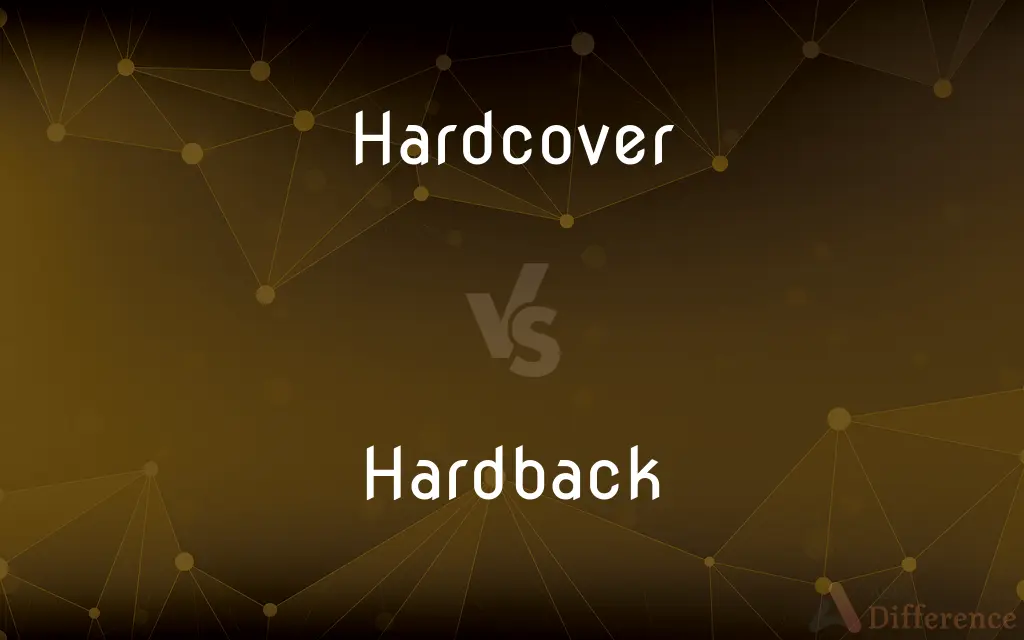Hardcover vs. Hardback — What's the Difference?
Edited by Tayyaba Rehman — By Fiza Rafique — Updated on November 3, 2023
Hardcover and hardback are two terms for books bound with rigid protective covers; they are interchangeable with no difference in meaning.

Difference Between Hardcover and Hardback
Table of Contents
ADVERTISEMENT
Key Differences
Hardcover books are known for their durability due to the sturdy binding and thick cover. The term "hardcover" is often used in the United States to refer to books with such bindings. Similarly, hardback is another term for the same type of book, predominantly used in the UK and other parts of the Commonwealth. Both hardcover and hardback books are designed to withstand frequent handling and the wear and tear that comes with it.
A hardcover book typically has a paper or cloth cover with a spine that is often bound with adhesive to a cardboard core. A dust jacket often accompanies hardcover books to protect the cover underneath, which is not necessarily a feature exclusive to either hardcover or hardback books, as both types can come with such protective covers. Hardback books share these characteristics, offering readers the same level of durability and a similar reading experience.
The terms "hardcover" and "hardback" also reflect the same level of quality and design effort that publishers invest in these books. Both are more expensive than their paperback counterparts due to the materials used and the more complex binding process involved. Whether one says hardcover or hardback, they are referring to a book that is built to last, often found in libraries and bookstores alike.
When it comes to collectibility, hardcover books are often more sought after by collectors due to their aesthetic and physical longevity. Hardback editions share this appeal, as they are also often first editions or special editions, making them desirable to those looking to add to their collection. The terminology does not affect the collectibility of the book, as both hardcover and hardback are considered premium formats.
In summary, both hardcover and hardback refer to books that have been bound with a solid and protective cover made of cardboard covered with cloth, paper, or leather. Whether one uses the term hardcover or hardback often depends on regional preferences rather than any material difference in the books themselves. They are synonymous and used interchangeably by readers, libraries, and booksellers around the world.
ADVERTISEMENT
Comparison Chart
Erminology Usage
Preferred in American English
Preferred in British English
Meaning
Books with a rigid protective cover
Books with a rigid protective cover
Binding
Rigid, durable binding
Rigid, durable binding
Dust Jacket
Often includes a dust jacket
Often includes a dust jacket
Collectibility
Sought after by collectors
Sought after by collectors
Synonymy
Another term for hardback
Another term for hardcover
Market Availability
Common in American bookstores
Common in British bookstores
Compare with Definitions
Hardcover
A book with a hard outer case that protects its pages.
The hardcover protected the pages from damage.
Hardback
"Her favorite novel was only available in hardback."
A preferred choice for book collectors due to their quality and longevity.
Hardcover
A high-quality book format that is more expensive than paperback.
He invested in a hardcover because it lasts longer.
Hardback
A book designed to endure frequent use and handling.
The author signed copies of the new hardback at the launch.
Hardcover
A book with a rigid, protective cover.
The library’s new arrivals included a selection of hardcovers.
Hardback
A common format for library books due to their strength and durability.
Libraries often stock hardbacks for their long shelf life.
Hardcover
A book bound with strong, resilient materials.
She preferred hardcovers for their longevity.
Hardback
"She bought the hardback for its sturdy construction."
A format often used for first editions and special releases.
Hardcover
A hardcover, hard cover, or hardback (also known as hardbound, and sometimes as case-bound) book is one bound with rigid protective covers (typically of binder's board or heavy paperboard covered with buckram or other cloth, heavy paper, or occasionally leather). It has a flexible, sewn spine which allows the book to lie flat on a surface when opened.
Hardback
A book bound with a solid cover, usually made from cardboard covered with cloth or paper.
Collectors prize first editions, especially in hardback.
Hardcover
(of a book) bound in stiff covers; hardback
Hardcover and paperback editions
Hardback
(of a book) bound in stiff covers
A hardback edition
Hardcover
A book bound in stiff covers; a hardback.
Hardback
A book bound in stiff covers.
Hardcover
Having a rigid binding, as of cardboard covered with cloth or with leather. Used of books.
Hardback
Hardcover.
Hardcover
A hardcover book.
Hardback
A book with a solid binding.
Hardcover
A book with a rigid binding, often of cardboard or leather.
Hardback
(of a book) Having a solid binding.
Hardcover
(of a book) Having a rigid binding.
Hardback
Having rigid front and back covers, usually boards covered with paper, cloth, or leather; - of books. Contrasted with softcover and paperback.
Hardcover
A book with cardboard or cloth or leather covers
Hardback
A book with cardboard or cloth or leather covers; a hardcover book. Compare paperback.
Hardcover
Having a hard back or cover;
Hardback books
Hardback
A book with cardboard or cloth or leather covers
Hardcover
A book edition that is often collected for its durability and aesthetic.
The first edition hardcover became a rare collectible.
Hardback
Having a hard back or cover;
Hardback books
Common Curiosities
Is there a difference in quality between hardcover and hardback?
No, the terms refer to the same quality and type of book binding.
What is a hardcover book?
A hardcover book is one with a stiff, protective binding.
Are hardcover and hardback the same?
Yes, they are two terms for the same type of book with a solid binding.
What does hardback mean?
Hardback is another term for a hardcover book, often used in British English.
Can I get a paperback book in hardcover or hardback?
Many popular paperbacks are also released in hardcover/hardback editions.
Should I buy hardcover or paperback?
It depends on your preference for durability versus cost.
Are hardcover and hardback books heavier?
Yes, due to the thicker covers and stronger binding materials.
Do hardcover books always come with dust jackets?
Most hardcover books have dust jackets, but it's not mandatory.
Are hardcover and hardback books better for collections?
They are often preferred by collectors for their durability and appearance.
Do libraries prefer hardcover or hardback books?
Libraries prefer these formats due to their long-lasting nature.
Do hardcover books last longer than paperbacks?
Yes, the sturdy construction of hardcovers/hardbacks generally lasts longer.
Can hardcover/hardback books be recycled?
Yes, but the hard covers must usually be removed first.
Why are hardcover/hardback books more expensive?
The materials and process for making hardcover/hardback books are more costly.
Can hardback books have different cover designs than hardcover?
No, they typically have the same design; only the term varies by region.
How do I care for my hardcover/hardback books?
Keep them in a cool, dry place, and handle them with clean hands.
Share Your Discovery

Previous Comparison
Little vs. Petite
Next Comparison
Done vs. DunAuthor Spotlight
Written by
Fiza RafiqueFiza Rafique is a skilled content writer at AskDifference.com, where she meticulously refines and enhances written pieces. Drawing from her vast editorial expertise, Fiza ensures clarity, accuracy, and precision in every article. Passionate about language, she continually seeks to elevate the quality of content for readers worldwide.
Edited by
Tayyaba RehmanTayyaba Rehman is a distinguished writer, currently serving as a primary contributor to askdifference.com. As a researcher in semantics and etymology, Tayyaba's passion for the complexity of languages and their distinctions has found a perfect home on the platform. Tayyaba delves into the intricacies of language, distinguishing between commonly confused words and phrases, thereby providing clarity for readers worldwide.















































